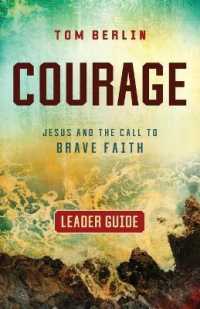Full Description
This exemplary Handbook provides readers with a novel synthesis of international research, evidence-based practice and personal reflections to offer an overview of the current state of knowledge in the field of teaching geography in higher education. Chapters cover the three key transitions - into, through, and out of higher education - to present a thorough analysis of the topic.
With key contributions from top scholars, the Handbook investigates student transitions, exploring how students require different pedagogical approaches as they progress through university or college. A wide range of learning contexts relevant to the breadth of spaces and places in which geography teaching takes place is used to provide examples of how teaching and learning in geography can be enhanced. It identifies key principles including working in partnership and acknowledging the whole student, calling for the adoption of courageous pedagogy.
With a useful resources section included in each chapter, this Handbook is a vital reference source for those teaching geography in higher education settings. Written in an accessible style, it will also be of use to early career geographers and those who are new to teaching, including postgraduate students.
Contributors: C. Arrowsmith, K. Barton, S. Brail, J. Bullard, G. Butt, W. Cartwright, L. Clarke, D. Conradson, M. DeMers, S. Dyer, J. Esson, M. Finn, E.H. Fouberg, D. France, I.C. Fuller, A.L. Griffin, M. Haigh, R.L. Healey, J. Hill, R. Hodgkins, P. Hopkins, M. Horswell, A. Hovorka, A. Hughes, N.T. Huynh, J. Kerski, P. Klein, P.E. Kneale, A. Last, J. Lee, A. Maddrell, N. McDuff, G. Miller, L. Mol, N. Moore-Cherry, C. Mott, A. Parton, E. Pawson, M. Poskitt, K. Ramdas, C. Ribchester, B. Rink, Z.P. Robinson, J. Salo, D.M. Schultz, I.D.H. Shepherd, M. Solem, R. Spronken-Smith, S. Tate, T. Vowles, H. Walkington, R.I. Waller, K. Whalen, E. Wigley, P. Wolf, N. Worth
Contents
Contents:
1. Introduction to the Handbook for Teaching and Learning in Geography 1
Helen Walkington, Jennifer Hill and Sarah Dyer
PART I PEDAGOGIES TO SUPPORT TRANSITION INTO HIGHER
EDUCATION
2. Student perspectives on the importance of both academic and social
transitions to and through their undergraduate geography degree 16
Simon Tate and Peter Hopkins
3. Bridging the divide between school and university geography -
'mind the gap!' 31
Graham Butt
4. Embodied teaching and learning through a large lecture: strategies for
place-based pedagogies 46
Matt Finn and Carrie Mott
5. Measuring learning for the masses: assessment strategies for large classes 59
Bradley Rink
6. Finding your way in liminal space: threshold concepts and curriculum
design in geography 71
Erin H. Fouberg
7. Fieldwork as transition pedagogy for non-specialist students in geography:
promoting collaborative learning amidst uncertainty 87
Kamalini Ramdas
8. Supportive learning environments and the transition to university 99
David Conradson
9. Teaching in a multi- or interdisciplinary context 110
Amy L. Griffin
10. Co-pedagogy: teaching together for successful student learning 123
Sarah Dyer
11. Pedagogies for developing undergraduate ethical thinking within geography 139
Ruth L. Healey and Chris Ribchester
12. Information literacy: benefits, challenges and practical strategies 151
Richard I. Waller, Gill Miller and David M. Schultz
PART II PEDAGOGIES TO FACILITATE MORE AUTONOMOUS
LEARNING
13. Inclusive teaching and learning practices in geography 168
Annie Hughes and Nona McDuff
14. Developing and integrating a student-researcher pedagogy within the
geography curriculum 183
Helen Walkington
15. Who owns the curriculum? Co-production of an evolving research-informed
module 198
Richard Hodgkins and Joanna Bullard
16. Conveying geographic concepts through issues-based inquiry 211
Phil Klein, Karen Barton, Jessica Salo, Jieun Lee and Timothy Vowles
17. Learning and teaching about race and racism in geography 227
James Esson and Angela Last
18. Teaching challenging material: emotional geographies and geographies of
death 241
Avril Maddrell and Edward Wigley
19. Geography as responsibility: sustainability through teaching and learning
within geography 256
Zoe P. Robinson
20. Enhancing internationalisation in the geography undergraduate curriculum 269
Ash Parton and Martin Haigh
21. Heutagogy, personal learning environments, and multi-path entry into GIS
education 284
Michael DeMers
22. Field-based pedagogies for developing learners' independence 299
Ian C. Fuller and Derek France
PART III CAPSTONE AND BRIDGING PEDAGOGIES FOR THE FINAL
YEAR
23. Pedagogical partnerships, identity building and self-authorship in geography
higher education 314
Niamh Moore-Cherry
24. Taking ownership: active learning and student engagement 329
Eric Pawson and Mark Poskitt
25. Examining the potential of experiential learning as pedagogy for senior
undergraduate students 342
Shauna Brail and Kate Whalen
26. Fieldwork in the undergraduate geography curriculum: developing
graduate skills 357
Lisa Mol, Michael Horswell and Lucy Clarke
27. Authentic assessment and feedback to develop lifelong learning 371
Jennifer Hill and Nancy Worth
28. Capstones in geography 386
Alice Hovorka and Peter Wolf
29. Learning for work 399
Ifan D.H. Shepherd
30. Embedding employability skills in the curriculum and extending into
postgraduate programs 414
Colin Arrowsmith and William Cartwright
31. Graduate attributes in geography higher education 430
Rachel Spronken-Smith
32. Teaching geography students about careers 443
Michael Solem, Niem Tu Huynh and Joseph Kerski
33. Exploring pedagogic tensions in final year programme design 458
Pauline E. Kneale
34. Teaching, learning and assessing in geography: a foundation for the
future 474
Jennifer Hill, Helen Walkington and Sarah Dyer
Index 487








